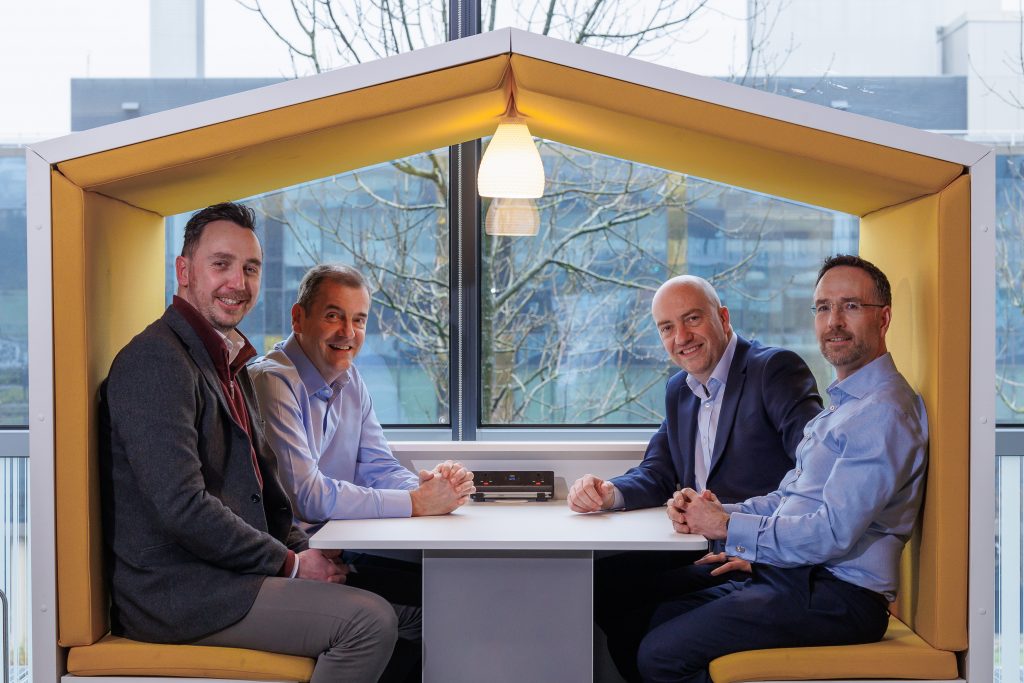John Peebles looked east for ideas to shake up his education training software start-up Administrate — and it paid off
Michael Glackin | Sunday, November 12 2017 | The Sunday Times

The offices of Administrate are unprepossessing — to say the least. The Edinburgh tech firm occupies a floor of Codebase, a Scottish tech incubator — the UK’s largest start-up hatchery — where 90 fledgling tech companies that have raised £400m in investment are based. In its previous life, Codebase’s HQ was a DHSS building. It retains something of the unwelcoming, clinical sparseness of its former occupant. In truth, Administrate’s office space looks like it is still under construction and the builders have nipped off to another job before they applied the paint. The same could also be said of Administrate’s chief executive, John Peebles, who greets me clad in an ill-fitting T-shirt and faded jeans with a loud: “Hey, how’s it going, man?” Peebles resembles a younger, slimmer version of the singer Meat Loaf, and dresses like Shaggy from Scooby-Doo. He fits perfectly into his surroundings.
Peebles is the driving force behind one of Scotland’s fastest-growing tech start-ups. Since launching seven years ago, Administrate has raised £6m from investors, including Edinburgh-based business angel syndicate Archangels. The company’s annual revenues remain undisclosed but are estimated to be about £2m. Like most tech start-ups, it has not yet posted a profit — more of that later — but it is now selling its educational software programs in more than 30 countries and employs about 40 staff. Investors attribute its expansion to Peebles, a cycling-loving, rock-music enthusiast who was recruited by Administrate from the US five years ago.
Born in Tennessee 34 years ago, Peebles lived in China from the age of two, where his father established a management training school in the early days of Deng Xiaoping’s open-door policy, which opened the communist country to western businesses and investment.
“Living in China then was very different to now,” explains Peebles as we stand in the corridor of his office searching for a couple of chairs to sit on. “There was absolutely no western influence. Back then you couldn’t direct-dial anywhere outside of China, even if you were lucky enough to have a phone.”
As China modernised, more western workers arrived, and Peebles Sr diversified into operating international schools for the children of foreign workers. “During the summer holidays I would teach English to kids, graduates and other adults. It turned out to be a great experience in terms of what we do now at Administrate. “I realised in addition to teaching in class there was an entire administrative process that went with the job — planning, content management, marking, reports. Our work at Administrate is to help businesses make those training processes simpler.”
Administrate provides software training platforms used by blue-chip clients such as PwC and York University to enable them to manage online teaching programmes. The global market for learning management systems (LMS) is forecast to be worth about £14.5bn in the next six years, up from £4bn last year. Administrate is positioning itself to get a slice of that growth. In the past two years it has opened offices in America, its largest market, and Lebanon, which services the fast-expanding LMS sector in the Middle East.
Peebles arrived at Administrate in 2012. After returning from China he was working for health tech firm Sentry Data Systems in Florida. He travelled to Scotland on a work trip — “I think my family originated in Peebles, so I wanted to visit” — and at the same time was offered a job at Administrate, becoming chief executive in the same year. As Peebles rolls off Administrate’s achievements — including its recent tie-up with CloudShare, one of Silicon Valley’s fastest-growing cloud-based tech firms — he has already anticipated my next question. “You want to know when we’re going to show a profit, right?” Investors too, I suggest. Tech start-ups have a habit of burning bright, burning money, and burning out. It’s a particularly pertinent question since, soon after Peebles took the reins at Administrate, he slashed staff working hours at the business by 20% with the introduction of a four-day week.
Before explaining the logic behind the move to a 32-hour week, Peebles takes on the question about investment and profit head on.
“It doesn’t feel comfortable when you are continually spending money, not for any business, and investors want to see a return,” he says. “But the investment is unlocking larger customers and generating value, and our investors see that. We’re conservative in money terms, and we’re efficient. But the good news is we’re looking at 2019 for a profit. We have good investors and we are totally transparent with them.”
And investors are clearly happy. One told me:
“We rate John very highly. We see where the company is going, and all the metrics are in the right direction.”
It’s also why investors were “totally supportive” of Peebles’s decision to put the company on a four-day working week, a move that was again inspired by his time in China.
Peebles says:
“China had a six-day week when I was a kid in a bid to catch up with the West. It was great. On a Saturday you could go to an amusement park and get on every ride — no queues — because no one else was there. When the Chinese government cut the working week down to five days in the mid-Nineties, productivity didn’t suffer at all — it shot up,
People in my experience are self-motivated and like to work hard, and can be just as productive over four days as five. Time off is good for productivity. China proved it, and as a company we’re hopefully proving it, too.”




